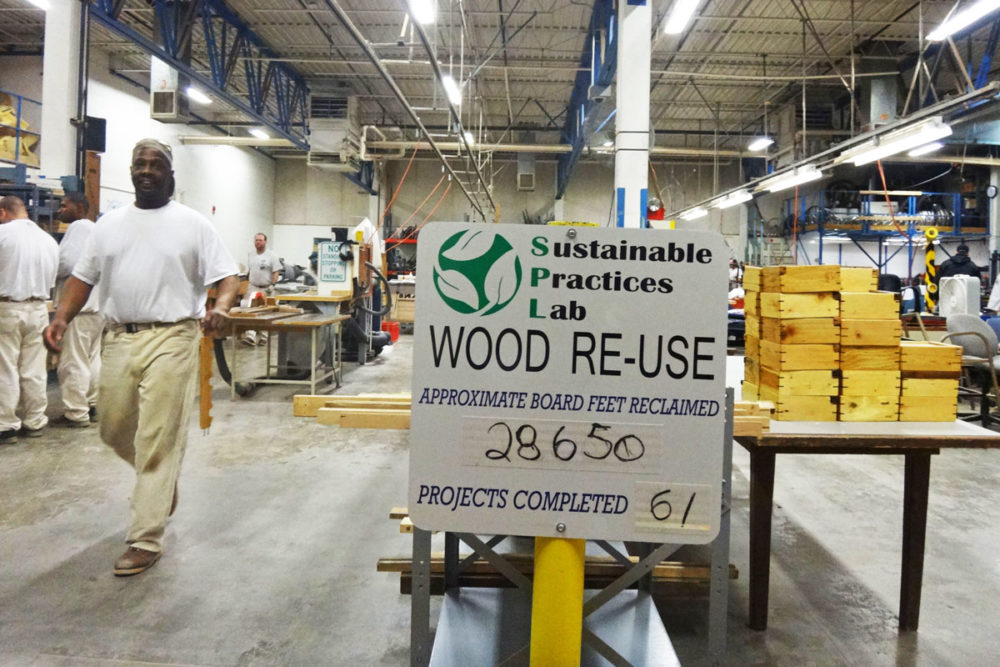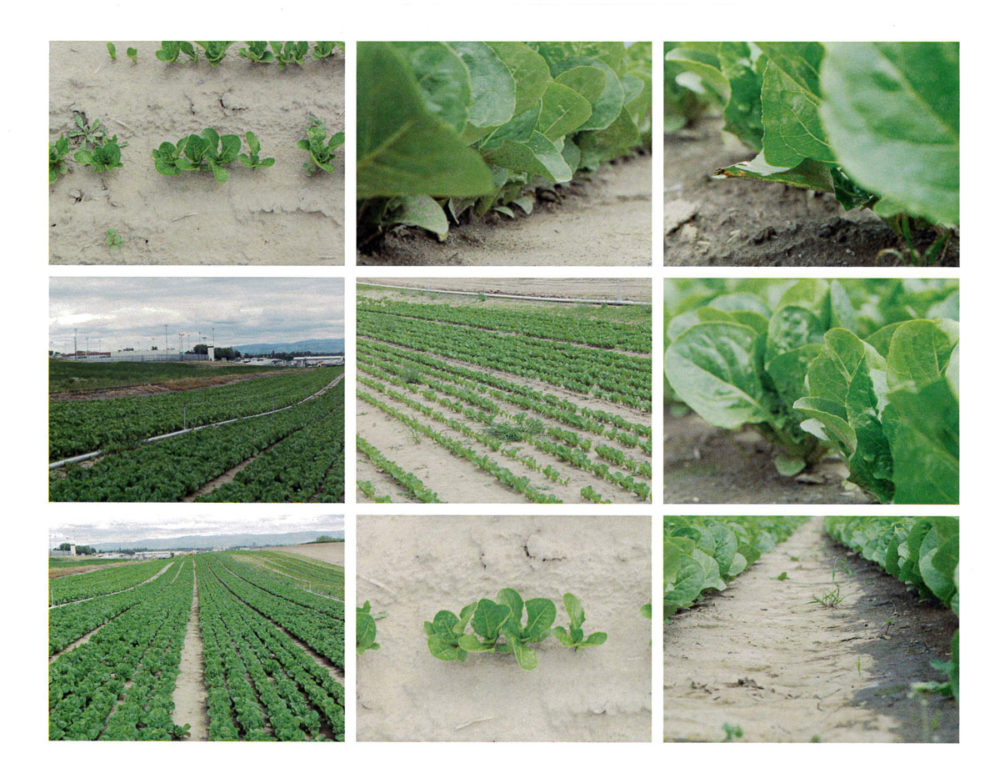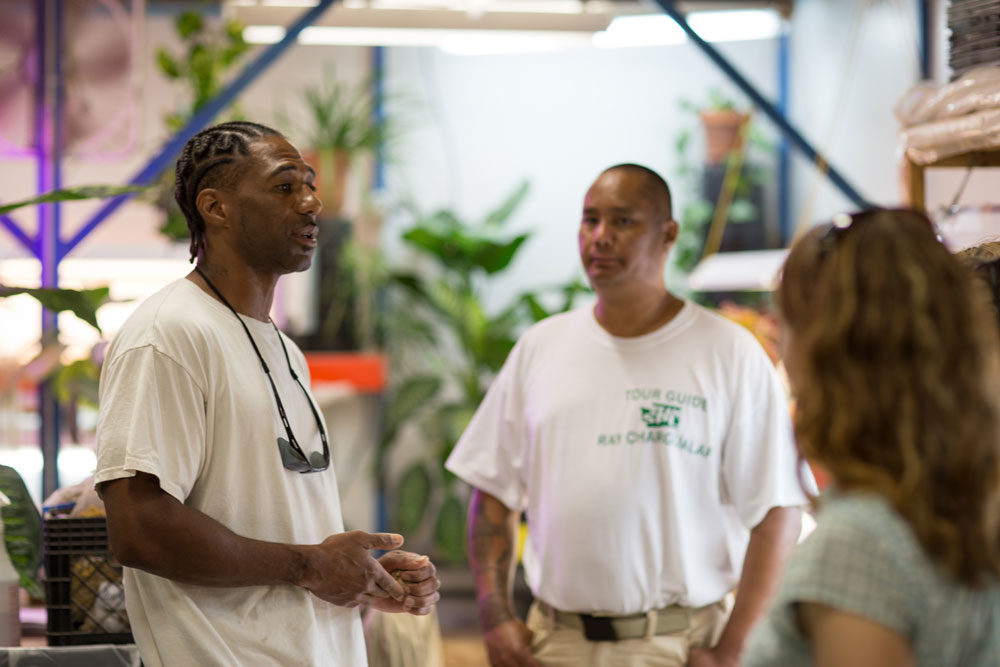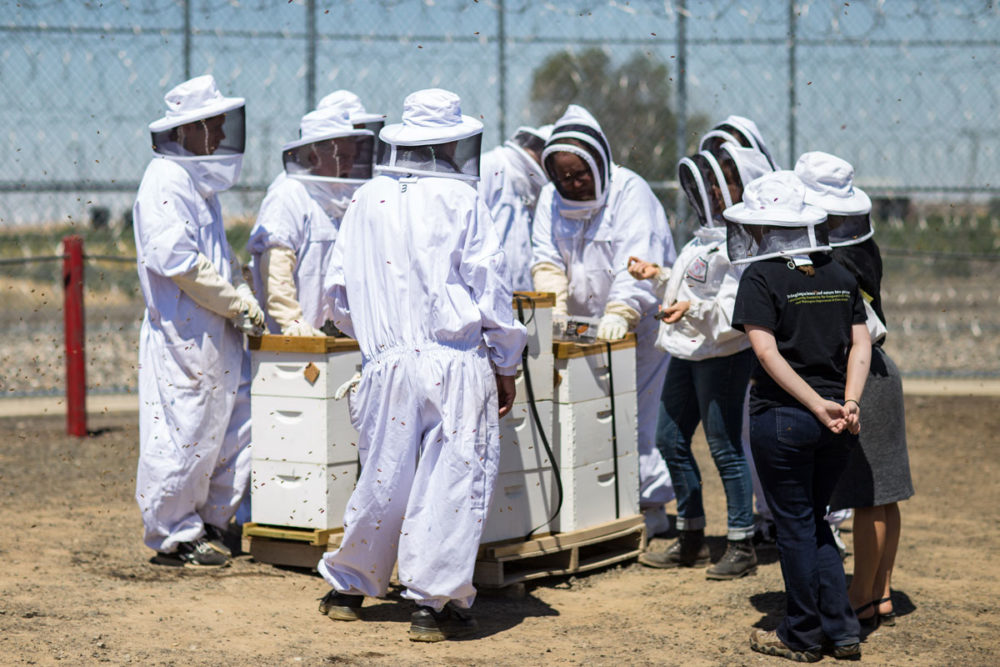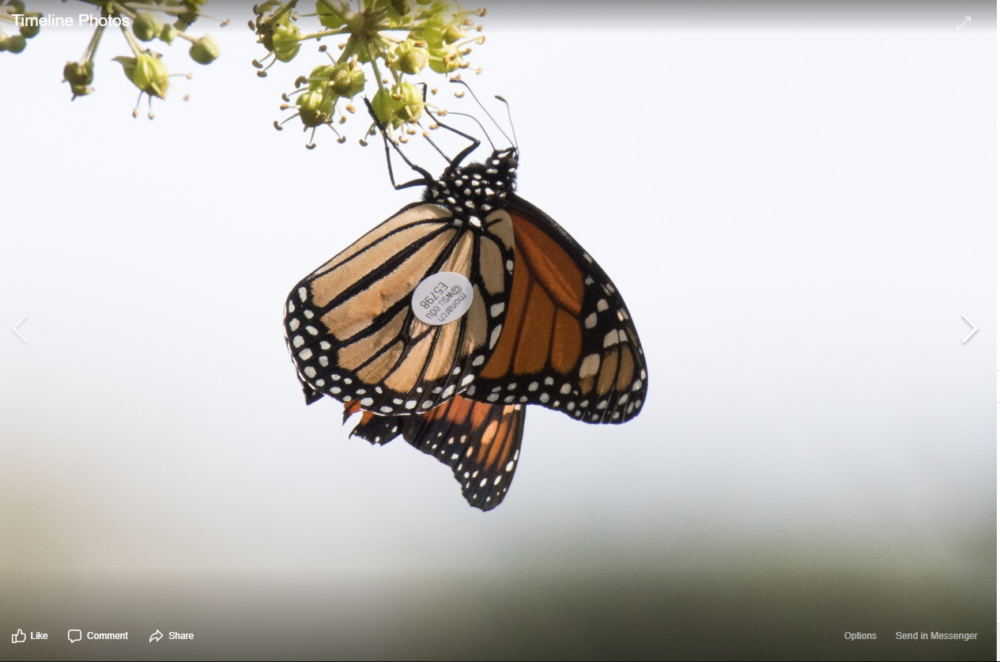Washington State Penitentiary (WSP)
| Area | Program | Program Partners | Highlights as of December 2020 |
| WSP | Monarch butterfly program, restoring Pacific Northwest populations | Washington State University Department of Entomology | Program currently suspended; in previous years the program raised Pacific NW monarchs from egg to butterfly. In 2018, raised and released 580 adult butterflies, all with wing tags for scientific tracking and reporting. |
| WSP | Institutional Sustainability Garden | Donate to Blue Mountain Action Council and Christian Aid Center | In 2020, grew ~89,000 lbs of produce, donated 23,530 lbs, remaining 65,054 lbs. for prison kitchen; 2018 grew ~110,000 lbs of produce, donated 2,471 lbs; remainder to prison kitchen, saving $122,677 |
| WSP | Waste sorting & recycling | In 2020, ~275,200 pounds of cardboard, metals, and batteries diverted to recycling; new recycle shop improved sorting | |
| WSP | Composting, main | In previous years, 75.9925 tons of post-consumer food waste to compost; 85.605 tons of post-consumer food waste to in-ground composting to improve soil in wheat fields; saves ~$150,000 in disposal fees | |
| WSP | Electrical upgrades | This past year, Facility Electrical Dept continued LED lighting retrofits: 90 perimeter pole lights, 282 fluorescent to LED replacements, 66 light fixtures, and 21 wall packs | |
| WSP | Water conservation | Government rebates via PPL Electric Utilities; ICON Systems Inc. | East Complex Big Yard switched from city water to well water. Net savings of ~$16,000 from city water and electricity costs |
| WSP-BAR | Kitten program | Blue Mountain Humane Society | Temporarily suspended due to COVID-19; in previous years, 125 kittens and cats (mostly kittens) socialized and raised for adoption |
| WSP-BAR | Crochet Program | Partnership with SPL, creating donation items, supports four paid positions for incarcerated workers | |
| WSP-MHU | Horticulture | Five flower plots for members of mental health programming | |
| WSP- SPL | SPL Overview | Sustainable Practices Lab: receive materials donations from partners; donated to 550 charities since start of SPL 2012 | Program donated 9,000+ items to nonprofits and provided 12,750 items for state use. All technicians receive education and training. COVID-19 was a large focus for SPL: 20,785 COVID-related items (face shields, barriers, and over 15,000 masks) were made out of donated fabric for the community and state. |
| WSP- SPL | SPL: Learning Center | Creates education curricula, manages inventory, coordinates events, TV repair and rental | |
| WSP- SPL | SPL: Wood Shop & Carving | WSP Employees Veterans’ Committee, Hard Headz, Habitat for Humanity, Humane Society, Fallen Outdoors, Salmon for Soldiers and other non-profit groups | 2,609 woodcraft items were created for state use. 1,943 items crafted and donated to nonprofits and charities. |
| WSP- SPL | SPL: Furniture Repair | Sort and salvage donated materials; 1,929 pieces of institutional furniture were repaired and put back into use; instruction on safety and tool use | |
| WSP- SPL | SPL: Aquaculture and Aquaponics | Grew 800lbs of lettuce for prison kitchen; built new outdoor tilapia pond and improved inside program structures; technicians train and practice in fish breeding | |
| WSP- SPL | SPL: Worm Farm | Produced 5 tons of worm castings within the past year and reduced institutional landfill impact by 5+ tons; worm products donated to nonprofits and used in institution gardens | |
| WSP- SPL | SPL: Art program | Various nonprofit partners | More than 492 unique and amazing paintings were created using recycled pallet wood and old bed sheets for canvas, which were donated to various charities |
| WSP- SPL | SPL: Quilting | Fallen Outdoors, United Methodist Church, Brian Fisher Memorial org, local retirement/convalescent homes. | Using donated or cast-off fabric and thread, constructed 480+ quilts and blankets for charity |
| WSP- SPL | SPL: Creative projects | In past year, created more than 60 projects such as puzzles and sculptures | |
| WSP- SPL | SPL: Water treatment systems | Project 41, Ohio State University, Duke University, Suez, Worldwide Assist, Assist International | New, larger-scale water filter system project in planning stages: 5-year project with 300 large water filters to be constructed at SPL for large-scale project throughout the Navajo Nation |
| WSP- SPL | SPL: Waste sorting and recycling | Sorts all of the waste created within the SPL for recycling/re-use/repurposing; shreds scrap cardboard and papers for composting and worm farm programs; non-repairable clothes cut up for cleaning rags; remaining cloth scraps are then shredded to be used as stuffing in the teddy bears. | |
| WSP- SPL | SPL: Roots of Success, environmental course | Roots of Success | Graduated 23rd class August 2018; 353 graduates so far; program on hold until funding available |
| WSP- SPL | SPL: Green Zone | Farm to school, Lettuce Grow, Master Gardening program, OSU | 8,900 lbs. of produce donated to Walla Walla Senior Center and local soup kitchens in response to increased need for meals due to COVID-19. Farm to school still operated this year with the local school districts, and SPL supplied 1,200 starter plants and 2,000 lbs. of compost. Educational learning for youth also provided by Farm to school organizers. |
| WSP- SPL | SPL: Green Zone composting | 40+ tons kitchen food waste combined with waste paper results in 20+ tons of finished compost; compost spread in Green Zone and other grounds | |
| WSP-South Complex | Rental garden boxes | 48 raised bed gardens, available to individual renters for personal use; program created with goal to reduce violence | |
| WSP-MSU | Beekeeping | West Plain Beekeepers, Washington State Beekeepers Association | 9 healthy hives; 44 Beginner certified beekeepers so far; two classes are in session now – a Beginner course with 7 incarcerated students and 2 staff members and a Journeyman course with 7 incarcerated students! Tried a new mite treatment this Spring that has worked well for their bees. |
| WSP-MSU | Sheep conservation program | Washington Department of Fish and Wildlife, Washington State University | Program active but some work is pending the appointment of a lead animal researcher for WSU; previous year, 9 Suffolk ewes produced 18 lambs; 10 female and 8 male; partners developed new data tracking systems and protocols. Certification and materials are in development |
| WSP-MSU | Flower gardens | Pollinator-friendly flower gardens, boxes, and baskets; added several new planter boxes and a pollinator garden of clover | |
| WSP-MSU | Rental garden boxes | 38 raised garden bed boxes used by 58 individuals; limited movement during COVID-19 pandemic caused some difficulty in accessing gardens. Despite these challenges, program received ~100,000 hours of participation | |
| WSP-MSU | Dog Program | Walla Walla Humane Society | Previous reporting period, 20 incarcerated individuals served 2,632 hours as handlers and walkers; currently suspended due to COVID-19 |
| WSP-MSU | Community crew | City/County of Walla Walla, Veterans Administration, Port of Walla Walla, Walla Walla Fairgrounds, Walla Walla Landfill, Walla Walla County Private Properties, and local Cities and/or Counties such as Waitsburg, Dayton, College Place, Prescott | Sustainability-related activities included landscaping, mowing, trimming, brush removal, cleaning out creeks, tree and shrub planting for fish and wildlife habitat, and pumpkin harvest; During COVID-19, crews have not been allowed out into the community and have focused on maintaining facility grounds |
Articles about WSP
2019
Growing food on a greater scale: WSP’s Institutional Sustainability Garden
Another Stellar Year for the Legendary Penitentiary Bee Program
2018
Sheep Husbandry Program: A New Collaboration for Conservation
A New Wildlife Conservation Program! Sheep Husbandry at WA State Penitentiary
Teddy bears and rebuilt bicycles: From prison to the community
Liaisons are our Roots for Success
2017
Inmates Assemble Life-Saving Clean Drinking Water Systems
2016
Washington State Penitentiary Collaboration for the Birds!
2015
Sustainable Practices Lab at WA State Penitentiary – Part 2
Sustainable Practices Lab at WA State Penitentiary – Part 1
2014
Washington State Monarchs Going the Distance
2013
Cat Program at WSP Has Staff & Inmates Smiling, Cats Purring
“Root View”: My Experience as a new Roots of Success Instructor
“Root View”: My Experience as a new Roots of Success Instructor
Sustainability Seminars begin at Washington State Penitentiary
